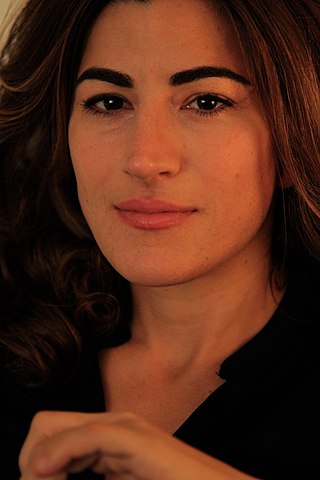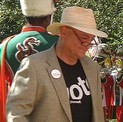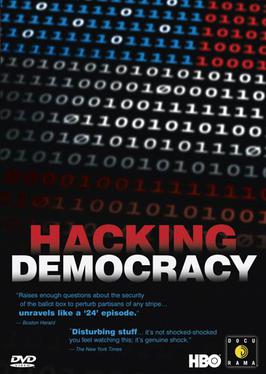DEF CON is a hacker convention held annually in Las Vegas, Nevada. The first DEF CON took place in June 1993 and today many attendees at DEF CON include computer security professionals, journalists, lawyers, federal government employees, security researchers, students, and hackers with a general interest in software, computer architecture, hardware modification, conference badges, and anything else that can be "hacked". The event consists of several tracks of speakers about computer- and hacking-related subjects, as well as cyber-security challenges and competitions. Contests held during the event are extremely varied and can range from creating the longest Wi-Fi connection to finding the most effective way to cool a beer in the Nevada heat.
Premier Election Solutions, formerly Diebold Election Systems, Inc. (DESI), was a subsidiary of Diebold that made and sold voting machines.
Bev Harris is an American writer, activist, and founder of Black Box Voting, a national, nonpartisan elections watchdog group. She helped popularize the term "black box voting", while authoring a book of that title.

Jehane Noujaim is an American documentary film director best known for her films Control Room, Startup.com, Pangea Day and The Square. She has co-directed The Great Hack and The Vow with Karim Amer.
The Volusia error was an incident that occurred during the 2000 United States presidential election in Florida.

Ion Voltaire Sancho was an elected official who served Leon County, Florida, as Supervisor of Elections for 28 years, from 1989 to 2017. During his time in office, he was admired for his integrity as a voter advocate and elections expert, and became nationally known for his role in the Florida presidential election recount of 2000. He was also known for his appearance in the 2006 investigative documentary Hacking Democracy.

Hacking Democracy is a 2006 Emmy nominated documentary film broadcast on HBO and created by producer / directors Russell Michaels and Simon Ardizzone, with producer Robert Carrillo Cohen, and executive producers Sarah Teale, Sian Edwards & Earl Katz. Filmed over three years it documents American citizens investigating anomalies and irregularities with 'e-voting' systems that occurred during the 2000 and 2004 elections in the United States, especially in Volusia County, Florida. The film investigates the flawed integrity of electronic voting machines, particularly those made by Diebold Election Systems, exposing previously unknown backdoors in the Diebold trade secret computer software. The film culminates dramatically in the on-camera hacking of the in-use / working Diebold election system in Leon County, Florida - the same computer voting system which has been used in actual American elections across thirty-three states, and which still counts tens of millions of America's votes today.
Dr. Herbert Hugh Thompson is a computer security expert, an Adjunct Professor in the Computer Science Department at Columbia University, and the Chief Technology Officer of NortonLifeLock. He is also the Chairman of RSA Conference the world's largest information security conference with over 25,000 attendees annually. Thompson is the co-author of a book on human achievement titled The Plateau Effect: Getting from Stuck to Success published by Penguin in 2013 and has co-authored three books on information security including, How to Break Software Security: Effective Techniques for Security Testing published by Addison-Wesley, and The Software Vulnerability Guide published by Charles River 2005. He is perhaps best known for his role in exposing electronic voting machine vulnerabilities as part of the HBO Documentary Hacking Democracy. He was named one of the "Top 5 Most Influential Thinkers in IT Security" by SC Magazine and has been referred to by the Financial Times as "One of the world’s foremost cryptology and internet security experts."
The Hursti Hack was a successful attempt to alter the votes recorded on a Diebold optical scan voting machine. The hack is named after Harri Hursti.

Harri Harras Hursti is a Finnish computer programmer and former chairman of the board and co-founder of ROMmon, where he supervised in the development of the world's smallest 2-gigabit traffic analysis product that was later acquired by F-Secure Corporation.
Simon Nicholas Knight Ardizzone is an editor and filmmaker. He produced and co-directed the documentary Hacking Democracy with Russell Michaels (2006) and co-directed Kill Chain: The Cyber War on America's Elections (2020) with Russell Michaels and Sarah Teale. He was an editor on the TV documentaries: God Is Green (2007); Britain's Greatest Monarch (2005); and What Made Mozart Tic (2004).
Cozy Bear, classified by the United States federal government as advanced persistent threat APT29, is a Russian hacker group believed to be associated with one or more intelligence agencies of Russia. The Dutch General Intelligence and Security Service (AIVD) deduced from security camera footage that it is led by the Russian Foreign Intelligence Service (SVR), a view shared by the United States. Cybersecurity firm CrowdStrike also previously suggested that it may be associated with either the Russian Federal Security Service (FSB) or SVR. The group has been given various nicknames by other cybersecurity firms, including CozyCar, CozyDuke, Dark Halo, The Dukes, Midnight Blizzard, NOBELIUM, Office Monkeys, StellarParticle, UNC2452, and YTTRIUM.

Eric Weinrib is a filmmaker and TV producer from Plainview, New York, United States.
Election cybersecurity or election security refers to the protection of elections and voting infrastructure from cyberattack or cyber threat – including the tampering with or infiltration of voting machines and equipment, election office networks and practices, and voter registration databases.
Karim Amer is an Egyptian-American film producer and director. He worked on The Square (2013) and The Great Hack (2019); the former was the first Egyptian film to earn an Academy Award nomination and went on to win three Emmy Awards, while the latter got nominated for an Emmy and a BAFTA Award. In 2020, he produced and directed The Vow, an HBO documentary series about the self-improvement group, NXIVM. In 2022, he produced and directed Flight/Risk for Amazon Studios, revolving around whistleblowers at Boeing.

Absolute Proof is a 2021 political propaganda film directed by and starring Mike Lindell. It was distributed by One America News Network and promotes the conspiracy theory that Donald Trump won the 2020 presidential election instead of Joe Biden. The documentary was removed by video hosting sites YouTube and Vimeo for violating their community standards.

Donie O'Sullivan is an Irish journalist working for CNN in New York.
Sarah Teale is a British-American documentary film producer and director, known for her Emmy nominated HBO documentaries Hacking Democracy, Dealing Dogs, The Weight of the Nation and Kill Chain: The Cyber War on America’s Elections.
Phillip Schopper is an Emmy-award winning film editor.







